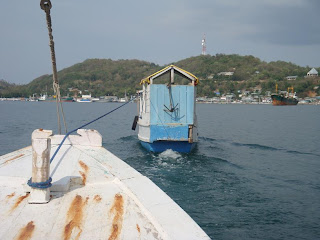I hope you all had a great Christmas in whatever part of the world you are reading this. It's now Tuesday morning and I'm back in Maumere after a week away at the western end of Flores – I won't bore you with a blow by blow account but here's a quick rundown....
On Tuesday (22nd) I travelled by bus to Ruteng, where I was just three weeks ago for Festus's party. This is a twelve hour journey with just one meal stop at about 2 pm and so I was very glad indeed to arrive and have a wash and something to eat. The next morning the journey resumed at 7 am, arriving in Labuanbajo, the port at the western end of Flores at about 11 am. I had already booked a room in the Golo Hilltop Hotel on the recommendation of Anouk in Ruteng so made my way there and found a very nice Dutch-run place with a great view of the bay slightly to the north of Labuanbajo.
Labuanbajo itself is very tourist oriented (I saw at least 8 different dive shops) and has more English language restaurants and bars than all the rest of Flores put together so is certainly the place to come if you are craving some kentang goreng (chips), sizzling hotplate dishes (local speciality) and menus in English.
On Thursday, I set off on a boat trip to Rinca (about two hours away) to visit the Komodo dragons. The boat journey was about two hours long and we passed some of the multitude of islands that dot the sea to the west of Flores, it is surprising to see how many of even the smallest of these are inhabited and it's hard to imagine what sort of existence is eked out here as most of these islands are volcanic with no fresh water.

There are about 1100 Komodo Dragons on Rinca, with more on Komodo Island itself. They normally live to about 50 years old and apparently their saliva contains about 50 different types of bacteria – if one catches up with you, you are more likely to die from septicaemia than from being eaten, especially as the nearest hospital is at least two hours away and is not up to much anyway. They can run at about 15 kms/hr but when I was there they were all snoozing in the midday sun, their most active times are early morning and late afternoon (outside visiting hours !). They are carnivorous creatures and a group of three or four komodos will make a buffalo last about four days.

However, they are also cannibalistic so their young very sensibly take to the trees as soon as they hatch from their eggs after nine months (I wonder if I got that right, that seems very long ?) until they are three or four years old. There are some safety precautions in place to prevent tourists being eaten : you can only wander around with a guide (who is armed with a long forked stick !), visitors are only allowed in the middle of the day when the dragons are laziest and - well, that's it really.
After my two hour very hot hike around the island it was time to board the boat and return to Labuanbajo - well, almost to Labuanbajo. A loud bang from the noisy engine, followed by total silence put paid to that plan but fortunately we were within mobile phone coverage and able to call for help so were towed in an hour or two later than planned. (And no, I didn't ask what we would have done if we had broken down thirty minutes earlier where there was no phone signal.)


The next day (Christmas Day) I boarded another boat to Pulau Seraya Kecil (Pulau = island, kecil = small or little) for two days of doing nothing. This is a fabulous place, a white sandy beach, about a dozen beachfront bungalows, a restaurant with a very limited menu (but plenty of cold beer), and a great coral reef for snorkelling. Electricity is provided by a generator which runs from about 6pm to 10pm every day and fresh water is brought to the island by tank and so is in very short supply and anyway is only available when the generator is running to power the pump. A very relaxing two days spent reading, swimming, snoozing and generally doing nothing .....
And then, THE BUS AGAIN..... Sunday started with the boat from Seraya to Labuanbajo, then the bus from LBJ to Ruteng.
Monday was another twelve hour marathon from Ruteng to Maumere, arriving home at 7 pm absolutely knackered. Today (Tuesday) I am relaxing at home, having just returned from the market with eggs, mangoes, bananas, a pineapple, tomatoes and cucumber so it will be French toast and pineapple for breakfast and tomato and cucumber salad for lunch. Tomorrow, back to work...